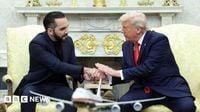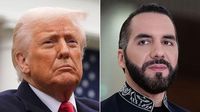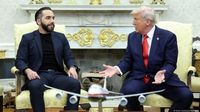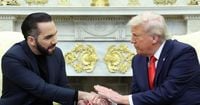In a significant meeting at the White House on April 14, 2025, President Donald Trump welcomed El Salvador's President Nayib Bukele, where the two leaders discussed a range of contentious issues, including the fate of Kilmar Abrego Garcia, a Maryland man mistakenly deported to El Salvador. The meeting underscored a growing alliance between the Trump administration and Bukele's government, which has been pivotal in facilitating the deportation of Venezuelan immigrants to the notorious Cecot mega-prison in El Salvador.
During the meeting, Trump expressed his appreciation for Bukele's assistance, stating, "Bukele is really helping out" the U.S. by enabling these detentions. The U.S. has begun deporting Venezuelans to El Salvador, where they are housed in conditions that have raised human rights concerns. Trump has even floated the idea of sending U.S. citizens convicted of violent crimes to the same prison, saying, "If it’s a homegrown criminal, I have no problem" with deporting them.
The case of Kilmar Abrego Garcia has drawn particular attention, especially since the U.S. Supreme Court ordered the Trump administration to facilitate his return after a federal judge ruled that he was deported in error. Abrego Garcia, who entered the U.S. illegally in 2011 and had been granted protection from deportation due to fears of gang violence in El Salvador, was sent back to the country on March 15, 2025. Bukele, however, dismissed the notion of returning him, labeling it "preposterous" and questioning how he could "smuggle a terrorist into the United States." This statement reflects the Salvadoran government's refusal to comply with U.S. court orders.
Attorney General Pam Bondi, present at the meeting, reiterated that the decision to return Abrego Garcia rested solely with El Salvador, stating, "That's up to El Salvador if they want to return him. That’s not up to us." She also mentioned that the U.S. would provide a plane if El Salvador decided to send him back. This stance has sparked concerns about the Trump administration's willingness to defy the courts, as it suggests they may not abide by the Supreme Court's directive.
Following the meeting, Bukele gave a thumbs up to reporters as he left the White House, indicating a positive rapport with Trump. The meeting also touched on various other topics, including transgender participation in sports, diversity, equity, and inclusion (DEI) initiatives, and international issues involving Iran and Ukraine.
Critics of the Trump administration's deportation policies argue that the administration has made a deal with Bukele that prioritizes political expediency over human rights. The Salvadoran president, who has been accused of authoritarianism, has accepted more than 200 migrants from the U.S., claiming to target gang members and violent criminals. However, evidence supporting these claims has often been lacking, with critics pointing out that many deportees are innocent.
Legal experts have raised alarms about the implications of Bukele's refusal to return Abrego Garcia, suggesting that it could lead to a constitutional crisis if the Trump administration continues to ignore court orders. The Supreme Court's ruling emphasized the need for the government to facilitate Abrego Garcia’s return, but the administration's current position seems to contradict that directive.
As the political landscape continues to evolve, the relationship between Trump and Bukele appears to be solidifying, with both leaders sharing a fondness for strongman tactics. Bukele has previously referred to himself as "the world’s coolest dictator," and Trump has praised his approach to governance, despite international concerns about human rights abuses in El Salvador.
In related news, the Trump administration is also moving forward with plans to impose tariffs on semiconductors, signaling a broader trade strategy that could affect U.S. consumers and businesses. As the administration faces internal and external pressures regarding its immigration policies, the situation surrounding Kilmar Abrego Garcia remains a focal point of legal and political contention.
As the administration prepares for a hearing on Abrego Garcia's case scheduled for April 15, 2025, the outcome may have significant implications for U.S. immigration policy and the administration's relationship with foreign governments like El Salvador.
The Trump-Bukele meeting has not only highlighted the ongoing deportation efforts but has also raised questions about the balance of power between the executive branch and the judiciary, as the administration navigates a complex web of legal challenges and international relations.
With both leaders committed to their controversial policies, it remains to be seen how this alliance will impact the lives of those caught in the crossfire of immigration enforcement and the broader geopolitical landscape.








